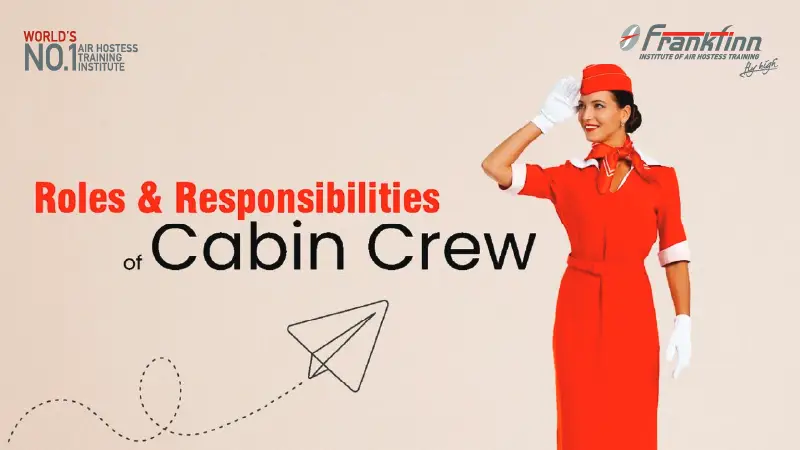Roles and Responsibilities of Cabin Crew: Insights into Modern Aviation
17 May, 2024 | By Frankfinn
Summary:
Cabin crew members play a very important role in every flight. Their job is not only to serve food or welcome passengers but also to make sure everyone stays safe and comfortable. Before the flight takes off, cabin crew checks the safety equipment, helps passengers find their seats, and guides them with safety instructions. You can read simple tips on how to prepare for a cabin crew interview here: How to Prepare for Cabin Crew Interview.
During the flight, they take care of passenger needs, handle any problems calmly, and work as a team to manage emergencies. Good communication, confidence, and soft skills are very important for this job. To understand why these skills matter, you can read: Importance of Soft Skills for Cabin Crew.
In today’s aviation industry, the cabin crew has become more professional and customer focused. With proper training, the right attitude, and strong soft skills, anyone can succeed and build a bright career in this field.
These include:
- Assisting passengers
- Preparing the pre-flight procedures
- Mandatory safety presentations
- Maintaining safety/security during flights
- Providing hospitality services
- Maintaining communication between the flight deck and passengers,
- Rendering post-flight duties
- Clarifying the specifications of every safety-equipment
Here we narrate the responsibilities of cabin crew, their priorities, relevance, cabin crew job description and more.
What are the Duties and Responsibilities of Cabin Crew?
- The crew needs to make sure that all necessary instructions are fluently and comprehensively communicated right before take-off.
- In any case of misunderstanding or delayed flight-intervals, the crew members must be well-adept at managing and neutralizing (uprising/heated) situations.
- Crew members must remain composed, calm and diligent throughout the entire flight-journey.
- The duties of cabin crew (fundamentally) cater towards hospitality services. Momentary serving of water, beverages, food and refreshments is a vital part of their role.
- Crew members are also tasked with the responsibility of maintaining a comfortable environment, both for the passengers and staff members, by keeping the environment clean, removing trash from the aisle and maintaining a professional (attractive) appearance.
Safety Responsibilities
The primary responsibility of cabin crew is to maintain safety and comfort for everyone.
- As passengers start boarding the plane, crew members must greet and welcome passengers to usher a homely and positive feeling.
- Right before take-off they are required to communicate the entire safety protocol of the journey and explain how to operate the available safety equipment.
- The cabin crew must make sure everyone is seated with their seatbelts on and that electronic devices are turned off.
- As the journey proceeds, flight attendants are required to fulfill the needs of customers, clarify doubts, boost morale, provide beverages, refreshments, food (when ordered)
- In case of any conflict, the crew members should resolve conflicts in a peaceful and negotiated manner.
- The emergency procedures must be comprehensively described to passengers, simultaneously maintaining a normalcy in their tone.
Cabin Maintenance and Hygiene
Maintenance of hygiene is essential for both the staff members and the passengers. The cabin crew must be regular in retrieving trash from the passenger's seats and aisle.
The garbage collecting cart is expected to be used a few times to ensure no litter in the environment and to maintain the clean state of the plane's interior.
Crisis Management and Security Protocols
A training program is conducted for new recruits. These programmes are integrated/structured mainly to brief the entire protocol, with the duties of maintaining safety and security during flight, providing customer and hospitality services, cabin management, maintaining cleanliness of the environment, enforcing rules/regulations, resolving conflict (and other related issues), anticipating passenger preferences and fulfilling their needs as required.
Communication and Coordination Skills
To enhance their skills in communication, coordination and management, they undergo Crew Resource Management (CRM) training programmes.
This altogether boosts morale and unites the crew as a tight-knit collective, whose efficiency reaches its maximum extents when working together. There are special simulated drills for the crew members, wherein their response mechanisms are put to test and simultaneously improved.
Conclusion
Cabin crew members must be ready to handle many kinds of situations. Whether it is an evacuation or any other emergency, they need to stay calm, think clearly, and support their team. Good communication and management skills are very important in this job.
Today, even private airlines are looking for trained and experienced cabin crew for their flights. This shows how important the cabin crew role is in making every journey safe and smooth. If you want to build a career in Aviation field, you can explore our training programs here: Frankfinn Cabin Crew Courses.
If you wish to know more or want guidance, you can fill out the form and our team will contact you: Click here to enquire.



